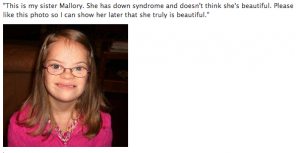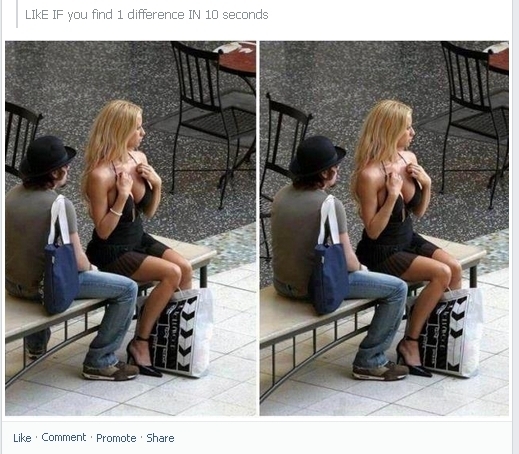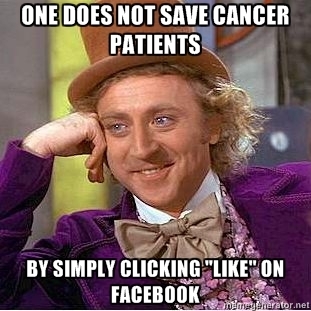Click “Like” if you know someone who has cancer
An increasing number of my Facebook friends seem to be falling for “Like” scams, and I’ve probably done so myself. The trouble is, it’s increasingly different to tell the genuine from the false on Facebook, because much of the false stuff is propagated by friends.
Some of the scams are easy to tell, as this article points out:
Pro tip: If you do see a post about sick kids with rare cancer who lost all their family to a horrible house fire and if you don’t like it then 100 more children will get cancer from terrorists – it’s not real. Don’t click on it.
via All About Those Facebook ‘Like’ Scam Posts | Daylan Does.
– yes, go ahead and read the article, it’s worth reading, even if the author does make a killing out of all the “likes” it gets.
 At least one of my Facebook friends has evidently fallen for the “This is my sister Mallory” scam, but, as the site referred to above points out
At least one of my Facebook friends has evidently fallen for the “This is my sister Mallory” scam, but, as the site referred to above points out
This post stated that someones ‘sister’ Mallory has down syndrome & doesn’t think she’s beautiful. It then asked for ‘likes’ it to show her she is.
The REAL story about this little girl is something much different: Read about it here
Or did you perhaps fall for this one?
Or did you fall for this one, perhaps?
 Why on earth should anyone click “like” if they had one of those?
Why on earth should anyone click “like” if they had one of those?
Has anyone who ever clicked “Like” on any of those stupid scams ever stopped to think about that?
Yes, we did have one, and I didn’t like it because my mother falsely accused me of breaking it when I was a kid and threw a temper tantrum the like of which I had never seen before, and nearly made me run away from home. But hey, 265,594 sheep can’t be wrong, can they?
And I remember greengrocer’s and their apostrophe’s too.
And then there’s this one:
I commented on that one in Facebook, pointing out that it was a scam, but of course the scammers don’t mind that — it’s all grist to their mill. As someone once said somewhere, there is no such thing as bad publicity. It doesn’t matter what comment you type, good or bad, each one adds to the value of the page when they sell it. That’s why they ask you to type meaningless words in comments to see what happens, and of course nothing happens, except that their comments counter clicks up another sucker. Perhaps people expect something to happen, like when you type “Do a” in a Google search box (go on, try it), but Facebook isn’t Google, and the scammers don’t seem to be as active on Google +… yet.
There are also the ones that say things like “95% of people get this wrong”, and the ones that have a bunch of letters in a square and ask you to type the first word you can see (yes, I fell for that one too).
Here are some more articles on the topic:
Budge: Facing up to Facebook scams.
You ‘like’, but are you being scammed?.
So how do you avoid the scams?
By being sparing in what you like, and in what you share.
Sometimes it is hard to tell, but if the sentiment is general and obvious, like “Click like if you have a nice daughter” or “Click like if you loved your mother”, then it is not only a scam, but a waste of space.
If the sentiment is specific and personal, then it’s probably OK. If a photo is their own work, and you like it, then by all means say so, but if it is a stock photo from somewhere else, with a trite sentiment superimposed, then it’s better to ignore it. If it points to a newspaper article, or a blog post, especially one that your friends themselves have written, then it is not likely that they are tallying up their “likes” or “shares” in order to sell a page. I don’t even mind the shameless self-promotion of my friends who are touting their books or short stories. If I’ve read them and like them, I’ll click like (yes, Fr Michael Lapsley, that means you, and I’ve even touted your book on my blog!)
So remember…








